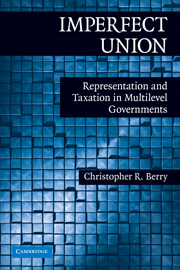Book contents
- Frontmatter
- Contents
- Preface
- Acknowledgments
- 1 Introduction: American Politics in 3D
- 2 What's Special about Special-Purpose Governments?
- 3 A Political Theory of Special-Purpose Government
- 4 Piling On: The Problem of Concurrent Taxation
- 5 Specialization and Quality
- 6 Governing the Fiscal Commons
- 7 Conclusion
- Methodological Appendix
- References
- Index
- Title in the series
6 - Governing the Fiscal Commons
Published online by Cambridge University Press: 05 June 2012
- Frontmatter
- Contents
- Preface
- Acknowledgments
- 1 Introduction: American Politics in 3D
- 2 What's Special about Special-Purpose Governments?
- 3 A Political Theory of Special-Purpose Government
- 4 Piling On: The Problem of Concurrent Taxation
- 5 Specialization and Quality
- 6 Governing the Fiscal Commons
- 7 Conclusion
- Methodological Appendix
- References
- Index
- Title in the series
Summary
The preceding chapters have demonstrated that when local governments overlap, the shared tax base takes on the character of a fiscal commonpool resource (CPR), leading to a familiar result; namely, “overfishing.” The aim of the present chapter is to investigate another dimension of jurisdictional overlap. In particular, one of the striking themes in the CPR literature is that institutions often develop, deliberately or organically, to mitigate the potential tragedy of the commons. What, then, are the institutions, if any, that govern the local fiscal commons? I argue that local political parties can play this role by coordinating the policies of multiple overlapping governments.
The chapter proceeds as follows. I begin by briefly reviewing the literature on successful CPR management. The remainder of the chapter focuses on the role of local political parties in managing the fiscal commons. I discuss parties first theoretically, exploring their means and motives in fiscal policy. Next, I provide an empirical test of the interaction between party organizational strength and jurisdictional overlap. The results indicate that counties with strong party organizations are able largely to overcome the fiscal common-pool problem of overlapping jurisdictions.
COMMONS KNOWLEDGE
In her seminal study of institutions governing CPRs, Elinor Ostrom observes that “At the most general level, the problem facing CPR appropriators is one of organizing: how to change the situation from one in which appropriators act independently to one in which they adopt coordinated strategies to obtain higher joint benefits or reduce their joint harm” (1990, p. 39).
- Type
- Chapter
- Information
- Imperfect UnionRepresentation and Taxation in Multilevel Governments, pp. 148 - 178Publisher: Cambridge University PressPrint publication year: 2009



